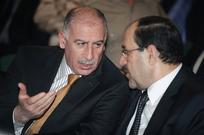 The speaker of Iraq’s parliament declared Thursday that lawmakers are prepared to oust the nation’s prime minister if he refuses to share authority with his political opponents and break a deadlock that has all but paralyzed the government.
The speaker of Iraq’s parliament declared Thursday that lawmakers are prepared to oust the nation’s prime minister if he refuses to share authority with his political opponents and break a deadlock that has all but paralyzed the government.
The threat by the speaker, Osama al-Nujaifi, a leader in the Sunni-dominated Iraqiya political coalition, counters a claim last week by Iraq’s president that there is not enough support in parliament to call a vote to push Prime Minister Nouri al-Maliki from power.
Speaking to reporters Thursday, al-Nujaifi said he personally believes al-Maliki, a Shiite Muslim, should step down from the job that he barely won after national elections in 2010 failed to produce a clear winner.
Since then — and particularly after U.S. troops left Iraq last December — critics have accused al-Maliki of sidelining his political opponents and violating agreements to share power within a unity government.
The political deadlock has all but brought Iraq’s government to a standstill so far this year.
Bickering between the Shiite-dominated government in Baghdad and the self-rule Kurdish region in Iraq’s north threatens to stunt vital foreign investment in the country’s lucrative oil industry.
Provinces with majority Sunni populations have threatened to create their own autonomous regions. Political lethargy, combined with red tape, has delayed improvements in many areas, including the nation’s electricity system, job creation and rooting out government corruption.
The deadlock has continued against a backdrop of sporadic but deadly bursts of violence: 120 Iraqis have been killed over the last 10 days alone in bombings mostly targeting Shiite pilgrims and security officials across Baghdad and beyond.
“This is a dangerous matter that if continued would lead to catastrophic consequences,” al-Nujaifi said as parliament prepared to return to work after a six-week recess.
He said al-Maliki would be summoned for questioning in front of parliament within days. “And if there is a parliament majority that is not convinced with the results of the questioning, then the no-confidence vote will take place,” al-Nujaifi said. He called the process “an attempt to put the country on the right track again.”
In April, heeding complaints from his followers, hard-line Shiite cleric Muqtada al-Sadr met with Sunni and Kurdish leaders in what was widely viewed as a summit to plot al-Maliki’s ouster. But on Thursday, al-Sadr released a statement on his website saying “he tends not to intervene” in such matters.
Last week, Iraqi President Jalal Talabani, a Kurd, said a preliminary count of lawmakers who want al-Maliki to step down fell four short of the 163 votes needed to force the issue. Al-Nujaifi denied that, saying that while a few lawmakers backed off, “the number is still enough.”
Responding, the prime minister’s media adviser, Ali al-Moussawi, said al-Maliki will answer parliament’s questions and respects his opponents’ rights to call for the no-confidence vote. “But we are confident that they will fail to secure the needed … votes,” al-Moussawi said Thursday.
Al-Maliki also has called for a special session of parliament to address lawmakers in public, said Safa al-Din al-Safi, the state minister for parliament affairs. A date for that session has not yet been set.
Al-Nujaifi also said he, too, would step down if enough lawmakers voted to expel him — a process he said was firmly guaranteed under Iraq’s constitution.
“Iraq has efficient and qualified people and figures who can lead Iraq and who can take Iraq into a new horizon,” he said. “Now we are in severe political crisis and we hope to get out of it.”
AJC /AP
Photo:

Leave a Reply
You must be logged in to post a comment.